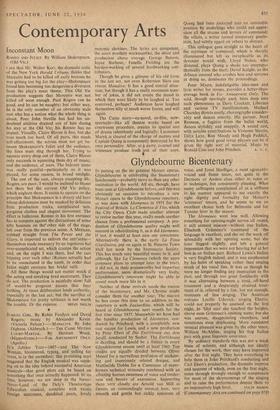JUBILEE GIRL. By Robin Fordyce and David
Rogers; music by Alexander Kevin. (Victoria Palace.)—MasiaLive. By John Dighton, (Aldwych.)—THE CAINE MUTINY COURT-MARTIAL. By Herman Wouk. (Hippodrome,)--FOR AMUSEMENT ONLY. (Apollo.)
IT's Jubilee Year-1887—and The New Woman, bloomered, typing, and yelling for votes, is in the ascendant; this promising start suggested that the English musical was catch- ing on to the idea behind successful American musicals—that good plots can be based on something that once actually happened. In no time, however, we are deep in the Never- Never-Land of the Daly's Theatre-type Edwardian musical, complete with exotic foreign mistresses, dandified peers, lovely
moronic chorines. The lyrics are competent, the score worthily workmanlike, the decor and production above average. George Benson, Joyce Barbour, Fenella Fielding are the hardest-working of several hardworking con- tributors.
Though he gives a glimpse of his old form in the last act, not even Robertson Hare can rescue Manalive. It has a good central situa- tion; but though it has a really enormous num- ber of jokes, it did not create the mood in which they were likely to be laughed at. Too contrived, perhaps? Audiences have laughed themselves silly at much worse farces, and will again.
The Caine story—ex-novel, ex-film, now- spectacle—like all theatre works based on courtroom procedure, creates its special sort of drama relentlessly and logically. Lieutenant Maryk is cleared of the charge of mutiny and Captain Queeg is competently destroyed by his own personality. After, at a party, counsel and witnesses produce truth out of their cups. Queeg had been jockeyed into an untenable position by underlings who could not appre- ciate all the strains and terrors of command; the villain, a writer turned temporary gentle- man, had subtly egged on others to distrust.
This epilogue goes straight to the heart of the mystique of command, which is sharply illuminated but left as inexplicable as its devotees would wish. Lloyd Nolan, who directed, plays Queeg a shade too unsympa- thetically from the start; David Knight, as the defence counsel who crushes him and sorrows at doing so, dominates the proceedings.
Peter Myers, indefatigable idea-man and lyric writer for revues, provides a better-than- average book in For Amusement Only. The acid, though sparingly used, bites deep into such phenomena as Davy Crockett, Liberate and various TV manifestations. Michael Chamley directs neatly, choreographs consider- ably and dances smartly. His partner, Noel Rossana, a fugitive from the balldt world, dances stylishly and snappily. A sound cast, with notable contributions in Vivienne Martin, Dilys Layc, Ron Moody and Hugh Paddick, shows bow good good revue players can be if given the right sort of material. Music by
Ronald Cass and John Pritchett. A. V. C.


































 Previous page
Previous page